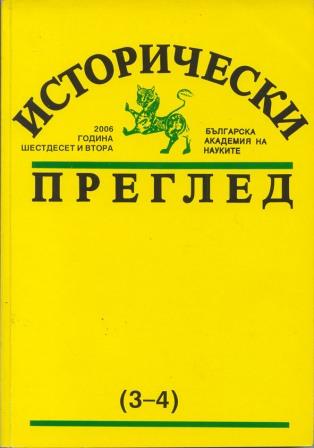Май 1968: Дьо Гол „на везните"
May 1968: De Gaulle "Put to the Test"
Author(s): Hristo MilkovSubject(s): History
Published by: Институт за исторически изследвания - Българска академия на науките
Summary/Abstract: It is not possible to attach a label to the French May 1968. It was called a “revolution” and a “pseudorevolution”, a “mutiny’ and a “carnival”, a “hurricane” and a “Bengal light”, “a positive event in French history” and actions of “niversity students who are afraid of Exams”. None of the definitions can exhaust the rich meaning of that month, which was a time when the whole society changed and when certain figures and political factors were revealed in a new light. This article aims to outline the whole international, European and national context of the 1960s, a decade of dramatic change, outside of which it is not possible to understand the origin of “May 1968”. The article also tries to outline the anticipating factors before the month which would become deeply engraved in the memory of the French people. The author also aimed to reveal the phases of the university crisis which turned into a social crisis that enveloped the French society, the major events and the actions of the new figures and forces in French political life. In the course of that crucial month the distinguished statesman and politician Charles de Gaulle - the person who had always led and won up until then, was .put to the test.. His work, the Fifth Republic which had been established under his guidance, and his mythology were questioned. The “player” who had always been able to make the right “move”, to be several moves ahead of his opponents, proved incapacitated. Even some of his closest people, let alone his opponents, thought that he had “gone mad”, that he was “done for”, and started to make plans for a new government. One of the most alert and active social groups - the university students - shouted: “Ten years are enough!” and sent the general to a home for elders. The slogan was taken up by the trade-unions and the workers. The strikes of millions of people paralised French economy. One of the crucial moments in that period was the “disappearance” of de Gaulle on 29 May and his visit to General Massu in Baden-Baden which preceded his triumphal return. The speech which he delivered on the following day dramatically turned “the needle of the Compass”. These events have been given various interpretations - from a .Machiavellian. move to a “deal” with the army. De Gaulle was once again at the top. The elections of 1968 were a triumph for Gaullism and a catastrophe for all of his opponents.
Journal: Исторически преглед
- Issue Year: 2006
- Issue No: 3-4
- Page Range: 104-131
- Page Count: 28
- Language: Bulgarian
- Content File-PDF

